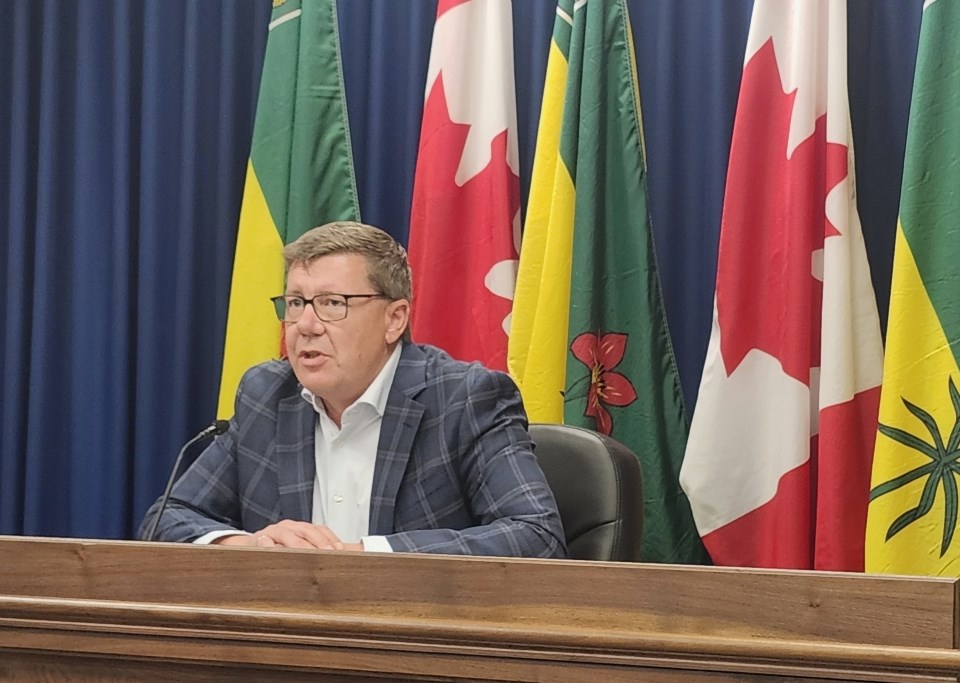SASKATOON — Premier Scott Moe is urging the federal government not to retaliate after US President Trump ordered an increase in tariffs on Canadian goods crossing south of the border to 35 per cent, effective Friday, Aug. 1.
Moe, like Prime Minister Mark Carney, expressed disappointment in the White House’s decision, which now includes non-CUSMA-compliant Canadian goods, but assured that Saskatchewan’s exports to the US remain tariff-free.
Causing Moe’s disappointment with the Trump administration’s decision is the adverse effect it brings on several Saskatchewan sectors, as it discourages investments in industries like forestry and steel.
“We have a conversation that we have to find a better place with when it comes to the steel industry. It's discouraging investment in the forestry industry as well, and other industries across Canada,” said Moe during Friday’s press event, Aug. 1, at the Saskatchewan Cabinet Office.
“Those essentially would have impacts directly from President Trump's decisions. But in the case of moving from a 25 per cent tariff to a 35 per cent tariff, that's not about five per cent of the exports that we send into the United States of America.”
He added that 95 per cent of Saskatchewan products, including copper, going to the US, is part of Canada’s efforts to ensure CUSMA remains in effect. CUSMA replaced the North American Free Trade Agreement, which aimed to improve economic trade between the three countries.
Moe thanked the Intergovernmental Affairs Minister of Canada, Dominic LeBlanc, for the efforts made by the Beauséjour-Petitcodiac MP to preserve the CUSMA, or the USMCA, exemption to the Canada-US trade partnership.
“It's critical to Saskatchewan, to Canada's trade with the US. It is something that no other country in the world outside of Mexico has access to right now, which in many ways makes some of our products relatively more competitive in the US versus products that might be coming in from Japan or the European Union, which have a broad-based 15 per cent tariff on them now,” said Moe.
“Our goal always is to have a competitive North American economic opportunity where we can trade north and south and east and west so that we can create our energy security, our manufacturing security, our food security, and ultimately collectively invest in the general security of our continent.
Moe added that he’s been saying, from the day Trump dangled the idea of imposing higher tariffs on the US’s trading partners like Canada, that the Aug. 1 announcement would have significant economic impacts. However, this also gives Canada an edge.
“Some of those impacts, as they are aligned with some of the broad-based tariffs to other countries, are going to allow for Canadian goods to become somewhat more competitive. So, credit to Minister LeBlanc for preserving that USMCA exemption that we have,” said Moe.
“I think we should double down on getting to an agreement, a more broad-based free or low-tariff agreement in North America in the days ahead. I've indicated that to Minister LeBlanc, and I know he's committed to continuing the conversation with [US Commerce] Secretary [Howard] Lutnick.”
Moe said the Saskatchewan government would continue engaging in trade talks with US businesses that benefit from the province’s industries, and lawmakers to improve the relationship between both countries, while also encouraging the federal government to remain cautious and to avoid putting more fuel on the fire.
“We would also continue to expand our export markets to over 160 countries around the world that buy Saskatchewan products. From the outset, we have maintained that the Trump tariffs will cause significant harm to the US economy, businesses, workers and consumers, and we are now seeing those effects. Canada should refrain from any retaliatory measures that would cause similar harm to our economy,” added Moe.




